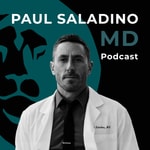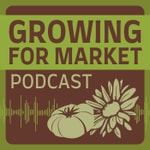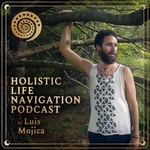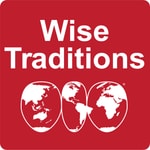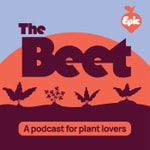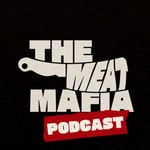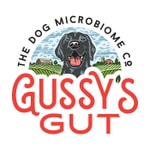Agrarian Futures – Détails, épisodes et analyse
Détails du podcast
Informations techniques et générales issues du flux RSS du podcast.
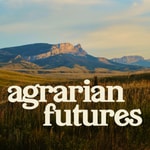
Agrarian Futures
Agrarian Futures
Fréquence : 1 épisode/18j. Total Éps: 26

Join hosts Emma Ractliffe and Austin Unruh as they explore what’s broken in our food system, and what it looks like to build something better.
Visit agrarianfuturespod.com to join our email list for a heads up on upcoming episodes and bonus content.
Agrarian Futures is produced by Alexandre Miller, who also wrote our theme song.
Instagram: @agrarianfuturespod
Twitter: @agrarianfutures
LinkedIn: https://www.linkedin.com/company/103857304/
Classements récents
Dernières positions dans les classements Apple Podcasts et Spotify.
Apple Podcasts
🇺🇸 États-Unis - nature
04/08/2025#92🇺🇸 États-Unis - nature
02/08/2025#82🇺🇸 États-Unis - nature
01/08/2025#51🇺🇸 États-Unis - nature
31/07/2025#46🇺🇸 États-Unis - nature
30/07/2025#42🇺🇸 États-Unis - nature
29/07/2025#40🇺🇸 États-Unis - nature
10/07/2025#96🇬🇧 Grande Bretagne - nature
13/06/2025#93🇬🇧 Grande Bretagne - nature
12/06/2025#72🇨🇦 Canada - nature
23/04/2025#95
Spotify
Aucun classement récent disponible
Liens partagés entre épisodes et podcasts
Liens présents dans les descriptions d'épisodes et autres podcasts les utilisant également.
See all- https://whiteoakpastures.com/
46 partages
- https://realorganicproject.org/
17 partages
- https://bookstore.acresusa.com/
14 partages
Qualité et score du flux RSS
Évaluation technique de la qualité et de la structure du flux RSS.
See allScore global : 89%
Historique des publications
Répartition mensuelle des publications d'épisodes au fil des années.
Rex Weyler on "Solving" Climate Change and Living Simply
Saison 1 · Épisode 14
jeudi 31 octobre 2024 • Durée 44:00
“I believe there is something dangerous about our entire notion of what a solution to climate change even is. We’re trying to engineer our way out of an ecological crisis that we engineered ourselves into. Growing bigger and more complex might not help. We’re going to have to humble ourselves first.”
In this episode, we were joined by the one and only Rex Weyler - activist, author, co-founder of Greenpeace, and a veteran of the ecology movement - to examine why the early momentum for ecological change slowed and how our obsession with controlling nature has led us astray. He offers a compelling critique of our collective fixation on technological fixes, arguing that it blinds us to a deeper truth: we’re part of nature, not separate from it.
Rex challenges us to rethink what living sustainably truly means and to question the myths of “green technology” and perpetual growth that define our modern world. Instead, he advocates for a life rooted in simplicity and intentional choices, where individual and community well-being align with the rhythms of the natural world. Join us as we explore Rex’s vision for a society that is rooted in an ecological lens, and learn how living simply might be the most radical—and effective—path forward.
In this episode, we cover:
- How Rex’s childhood in wild places shaped his appreciation for the natural world.
- The radical origins of Greenpeace and the famous intervention that launched “Save the Whales”
- An exploration of why the environmental movement has been - in Rex’s words - “mostly a failure.”
- Why Rex believes we lost an important concept in transitioning from an “ecological” movement to an “environmental” movement
- How our fixation on growth undermines efforts to halt climate change.
- Positive examples of communities living in harmony with nature
- The joy and restorative power of living simply
- And much more...
More about Rex:
Rex Weyler is a writer and ecologist. His books include Blood of the Land, a history of indigenous American nations, nominated for a Pulitzer Prize; Greenpeace: The Inside Story, an account of the first decade of the Greenpeace organization and a finalist for the Shaughnessy-Cohen Award for Political Writing; and The Jesus Sayings, a deconstruction of first century history and finalist for the BC Book Award. In the 1970s, Weyler was a cofounder of Greenpeace International and editor of the Greenpeace Chronicles, the organization's newsletter. In the 1980s, he founded the Hollyhock Learning Centre in BC, Canada. He currently works with the International Bateson Institute as an ecology researcher and teacher. He lives on Cortes Island in British Columbia, Canada.
Agrarian Futures is produced by Alexandre Miller, who also wrote our theme song. This episode was edited by Keith J. Nelson.
Bringing Back the Community Bank with Charley Cummings
Saison 1 · Épisode 13
lundi 21 octobre 2024 • Durée 40:48
If most of us are honest—banking probably isn’t the first thing that comes to mind when we think about social and environmental change. But what if it could be?
In today’s episode, we talk with Charley Cummings, CEO of Walden Mutual, an innovative bank that’s restoring a community-driven model that has largely disappeared in the face of 50 years of banking consolidation.
Charley walks us through the recent history of US banking and how the fundamental thesis behind it has changed, leaving many behind. He explains how is own experience as the founder of Walden Local - a sustainable meats company - helped him see the lack of a local financing option that embodied his values. From there, Charley dives deep into their community driven model, showcasing what a relationship-driven, place-based banking model could mean for the future of local agriculture and our food systems at large.
In this episode, we cover:
- Charley’s political origins and how he came to see the need for a new model for community financing.
- The essential role that community banking played in building the American middle class.
- How shareholder primacy - which is taken as gospel now - is a societal construct that arose in the 1970s and has fundamentally reshaped our banking system.
- How they are restoring character based lending through a fusion of modern tools and a relationship driven approach.
- Financing local economic “ecosystems” in order to create mutually
- What a place-based banking model could mean for the future of food systems.
- And much more...
More about Charley:
Charley Cummings is the founder and CEO of Walden Mutual Bank, the first newly chartered mutual bank in the US in 50 years. Walden Mutual lends to sustainable food and agriculture businesses in New England and New York, while offering impact driven online and mobile deposit accounts to businesses and consumers. Charley previously founded and ran Walden Local, Inc., now the leading brand of locally produced pasture-based meat in the Northeast. Previously he worked at various venture-backed clean technology companies and co-founded a non-profit advocacy organization formed in support of the country's first proposed offshore windfarm. Charley began his career at Monitor Group (now part of Deloitte) and earned a BA from Brown University and an MBA from Harvard Business School. He lives with his wife, three children and small flock of Kitahdin sheep in Hopkinton, New Hampshire.
Agrarian Futures is produced by Alexandre Miller of You Should Have a Podcast, who also wrote our theme song.
Restoring the Oak Savanna Through Farming with Peter Allen
Saison 1 · Épisode 4
mercredi 5 juin 2024 • Durée 55:24
In this conversation, Peter Allen of Mastadon Valley Farm challenges everything you think you know about climate change, eating beef, and the potential for food abundance grown regeneratively on the land. He brings a unique perspective as both a seasoned academic ecologist and someone with practical experience creating a profitable regenerative farming business.
In this episode, we cover:
- How Peter made the jump from academia into full time regenerative farming
- How management and stewardship of the land by indigenous people brought about the rich topsoil in the midwest - and how we’re quickly destroying that
- The environmental value of a savanna ecosystem, and how they’re going about restoring it
- The short term challenges - and long term advantages - of farming regeneratively
- Why eating regenerative beef is actually good for you and the environment
- How each of us can restore our land through our diet and purchasing choices
- The potential for layered commercial enterprises on the land for greater profitability and efficiency
- How the conversation around climate change disempowers people to make change, and why we should talk more about ecosystem restoration.
- And much more...
More about Peter:
Peter is an ecologist-turned-farmer and applies his background researching and teaching ecology and complex systems science towards the design, restoration, and management of diverse and agriculturally productive ecosystems. He owns and operates Mastodon Valley Farm, a 220-acre regenerative farm in Southwestern Wisconsin where he has built a timber-frame homestead from the farm's trees, planted thousands of fruit and nut trees, and grazes cattle, sheep, goats, pigs, and poultry across their fertile valleys, steep hillsides, and restored native prairie pastures. Peter and his wife Maureen grow their family's food on their homestead where they are homeschooling their children nestled in a grove of oak trees. Peter combines his background with over a decade researching and teaching ecology and complexity science together with over a decade of experience farming regeneratively to provide unique and effective consulting and educational opportunities, helping people design, build, and manage diverse, ecologically functional, and economically profitable agroecosystems.
Agrarian Futures is produced by Alexandre Miller, who also wrote our theme song.
Modern Horse Logging with Daphné Rose Courtés
Saison 1 · Épisode 3
mercredi 22 mai 2024 • Durée 31:52
In our increasingly technology-driven and urbanized culture, who hasn’t fantasized from time to time about getting out of the hustle and bustle, moving to the woods, and reconnecting with the natural world? Today we’re joined by Daphné Rose Courtés a horse logger in rural Quebec who has done exactly that.
In this conversation, Daphné gave us a picture into the day to day life of her and her horse, Fred, which showcases a true agrarian lifestyle in 2024. She is an inspiring example of someone who has followed their own intuition and embraced difficult, but fulfilling work back on the land.
In this episode, we cover:
- How Daphné found her way from Paris to working as a horse logger in Quebec
- Finding the beauty in both rural and urban life
- Exploring her close bond with her horse, Fred
- The importance of finding a good mentor
- The ecological benefits of horse logging vs conventional
- The challenges of being one of the few woman horse loggers
- The horse logging community and how they welcomed in Daphné into their ranks
- How someone could get into horse logging themselves
- And much more...
More about Daphné:
Daphné was born and raised in Paris and she started riding horses at a very young age. After moving to Quebec, she did a three year program in growing organic fruits and this is how she met Paul Chaperon and his family during an internship. He became her mentor and gave her the opportunity to use horses everywhere on a farm. From doing loose hay, logging, seeding, plowing and much more, it revealed her passion for working horses. She started her own small-scale logging business after buying one of her mentor’s horses, Fred. Using a single horse, the goal of her new project is to harvest wood in an ecological and thoughtful way.
Interested in learning more about horse logging? Check out the Draft Animal Power Network's podcast here.
Agrarian Futures is produced by Alexandre Miller, who also wrote our theme song.
Igniting a Farmland Commons Movement with Kristina Villa
Saison 1 · Épisode 2
lundi 13 mai 2024 • Durée 45:34
Today we are joined by Kristina Villa of the Farmers Land Trust who is confronting one of the most intractable challenges and deepest inequities within our food system today: Land access and tenure.
Kristina shares her remarkable journey that has culminated in launching her own organic farming business and founding an organization that enables emerging regenerative farmers to gain access to arable land that then can be held in community for generations rather than going back into a commodity market that favors traditional development.
In this episode, we cover:
- Kristina’s story and how her childhood reliance on food banks led her to organic farming and launching the Farmers Land Trust
- The importance of thinking about land transition to help aging farmers pass on their legacy
- Why we’re meant to farm in community
- Layering enterprises to get more people back on the land
- Crowd-sourcing land acquisition
- Addressing inequity in land access, ownership, and tenure through a farmland commons strategy
- How anyone can start their own community land trust
- Kristina’s advice for getting into farming from a non-farming background
- And much more...
More about Kristina and the Farmers Land Trust:
Kristina Villa is the Co-Executive Director of The Farmers Land Trust, and is a farmer, communicator, and community coordinator who believes that our connection to the soil is directly related to the health of our bodies, economy, and society. With over a decade of farming, communication, and fundraising experience, Kristina enjoys using her skill sets to share photos, stories, and information in engaging ways which help to inspire change in human habits and mindsets, causing the food system, climate, and overall well-being of the world to improve. Kristina has spent the last several years of her professional career saving farmland from development and securing it in nonprofit land holding structures that give farmers, stewards and ranchers long-term and affordable access and tenure to it. Most of her work in the land access space has focused on equitable land security for BIPOC growers, addressing the inequities and disparities in how land is owned and accessed in this country.
Find the Famers Land Trust on social media at: Facebook, Instagram, TikTok, LinkedIn, X, Youtube
Agrarian Futures is produced by Alexandre Miller, who also wrote our theme song.
Building the Next Generation of Agrarians with Josh Payne
Saison 1 · Épisode 1
lundi 22 avril 2024 • Durée 50:20
It's no secret that conventional farming is wreaking havoc on America's farmland, but is it really economically possible to convert conventional row crop farms to a regenerative approach that heals our planet? And how can the concept of an agrarian help foster stronger ties between rural farming communities and the cities they feed?
In this first episode, we dig into the answer with someone who's done it: Josh Payne of Rusted Plowshare Farm shares the story of how he and his sister Larin transformed their grandfather's corn and soy row crop operation into regenerative pastureland complete with sheep and cattle, microgreens, and over 30 acres of chestnuts.
In this episode, we cover:
- What it means to be an Agrarian
- How they transformed their farm from conventional row crops to regenerative
- Caring for each other through disagreement
- The concept of the "hinterland," and how to create stronger ties between urban and farming communities
- Keys to establishing regenerative pastureland
- And much more...
Learn more about Josh, Larin, and their farm here.
Agrarian Futures is produced by Alexandre Miller, who also wrote our theme song.
An Introduction to Agrarian Futures
Saison 1 · Épisode 1
lundi 22 avril 2024 • Durée 01:05
Welcome to Agrarian Futures, a podcast exploring a future centered around land, community, and connection to place.
Join hosts Emma Ractliffe and Austin Unruh as they chat with farmers, philosophers, and entrepreneurs reimagining our relationship to the land - and to each other - to showcase real hope and solutions for the future.
Life on the Range with Tyler Lu
Saison 1 · Épisode 12
samedi 5 octobre 2024 • Durée 21:11
What does it take to leave the city behind and embrace the life as a cowboy? In this episode, we trace Tyler’s unique path from competitive running, to beekeeping and vegetable farming, to life as a regenerative cattle rancher. Tyler shares the transformative experience of building a relationship with the land, the day-to-day realities of cowboy life, and the complex dynamics of being a non-binary person of color in a traditionally conservative rural setting. We also dive into the myths surrounding the cowboy legend, exploring the true, multicultural history behind the iconic figure.
Tyler’s journey is one of both personal and professional evolution. As we discuss the social challenges of transitioning from an urban environment to a rural community, Tyler opens up about their experiences of belonging, identity, and ambition. This episode invites you to reimagine the past, present, and future of the cowboy.
In this episode, we cover:
- Tyler’s winding journey from beekeeping, to vegetable farming, to ranching in rural Montana
- The day to day lifestyle of a regenerative rancher
- How Tyler’s relationship to the land has evolved over their time as a cowboy
- Navigating the social dynamics as a city dweller moving to a rural community, and the added complexities of being a non-binary person of color in the rural West.
- The real history of the cowboy and how our popular culture mythos doesn’t capture the complex and multicultural history behind it.
- And much more...
More about Tyler:
Tyler is a long haired, tattooist and body modification enthusiast, Asian, non-binary agricultural labour who is working up to starting their own enterprise, dreams, and place in life. They grew up in the city life of Georgia and spent most of their formative years in San Jose California where they found their love for a career in the agricultural sphere. Tyler and their dog Sage the border collie are currently residing and working in Roundup Montana.
Agrarian Futures is produced by Alexandre Miller of You Should Have a Podcast, who also wrote our theme song.
The New American Shepherd with Cole Bush
Saison 1 · Épisode 11
mardi 17 septembre 2024 • Durée 35:23
For Cole Bush, life as a shepherd is more than a job—it’s a calling. As the founder of her own grazing business in Southern California, she's using livestock to help restore land, reduce wildfire risks, and promote better agricultural practices. At the same time, she’s using her knowledge to train the next generation of pastoral graziers through the Grazing School of the West.
We’ll dive into her journey, sharing the insights she gained along the way about the co-evolution of humans, animals, and our environment. Cole’s work is changing the way people think about grazing, and today, she’s here to share how livestock can be a powerful tool for healing the land.
In this episode, we cover:
- An introduction to prescribed grazing - using sheep and goats to benefit local ecosystems.
- The history of pastoralism in California and how plants, animals, and people have co-evolved.
- Pastoral strategies to build fire resilience.
- The importance of learning from ancient indigenous practices
- Training the next generation of graziers through the Grazing School of the West.
- And much more...
Learn more and get in touch with Cole at Sherpherdess Land and Livestock and the Grazing School of the West.
Follow her on Instagram:
@bcbshepherdess
@shepherdess.land.and.livestock
@shepherdesshides
@grazingschoolofthewest
More about Cole:
Cole Bush, known for bringing the practice and ancient vocation of shepherding to Southern California, is an entrepreneur, advocate, and creative liberator in the fields of climate-beneficial agriculture, land stewardship, and prescribed grazing. With over a decade of experience, Cole has developed and managed prescribed grazing projects on thousands of acres of private and public lands throughout California for ecological enhancement and fire hazard reduction. Guided by her drive for meaningful work Cole is passionate in supporting others to find vocational pathways for non-traditional agrarians.
She is the founder of Shepherdess Land and Livestock Co. - a prescribed grazing company based in Ojai, California, Shepherdess Holistic Hides - a purveyor of mindfully sourced sheep hides, and Grazing School of The West - a non-profit 501(c)3 multidisciplinary vocational training program for the next-generation of graziers.
Agrarian Futures is produced by Alexandre Miller of You Should Have a Podcast, who also wrote our theme song.
How Big Food Stole Organic, and the Fight to Reclaim It with Dave Chapman
Saison 1 · Épisode 10
mercredi 4 septembre 2024 • Durée 44:24
In the 1990s, the success of the US organic movement seemed undeniable. Demand for healthy, chemical-free produce skyrocketed amidst public health concerns and a growing environmental consciousness. As a consequence, many small organic farmers could make a real living selling healthy produce and restoring farmland in the process.
In the decades since, however, the story has gotten much more complicated.
Corporate co-optation, lax government oversight, and splinters within the movement itself have created a new set of challenges for organic farmers and activists - challenges our guest today is helping lead the fight to overcome.
Dave Chapman is a lifelong organic farmer, and Co-Director and Board Chair of the Real Organic Project, an organization dedicated to reigniting and reconnecting the organic movement. In this episode, he takes us through the history of the organic movement, where it is today, the differences and similarities between organic and “regenerative”, and where the movement can go from here.
In this episode, we cover:
- The history of organic, tracing its roots from indigenous practices to modern day agriculture.
- The original definition of organic and the fight to maintain those core principles through the Real Organic Project.
- The longtime debate over certification and institutionalization.
- The organic boom, the entrance of Big Food into the marketplace, and the challenge of enforcement.
- “Regenerative,” and the risk of cooptation of any new label.
- The difference between building brands and building movements, and an insight into what that movement can look like.
- And much more...
Learn more about Dave and the Real Organic Podcast at the Real Organic Project.
More about Dave:
Dave Chapman is a lifelong organic farmer who runs Long Wind Farm in Vermont. They grow the best tasting organic tomatoes in the country in the fertile soil underneath a glass greenhouse. He is the Co-Director and Board Chair of the Real Organic Project, dedicated to reigniting and reconnecting the organic movement. He leads the Real Organic Podcast, providing a platform for many organic farmers, eaters, scientists, authors, educators, activists, and chefs. He was a co-founder of Vermont Organic Farmers in 1985, and was among those first certified by the USDA’s National Organic Program in 2003. He served on the Policy Committee of the Organic Farmers Association for 6 years. He also served on the USDA Hydroponic Organic Taskforce. He has worked for years as an advocate for reform of the National Organic Program. He has met with Secretary Vilsack seeking reform of the organic program. His latest project is the creation of the Tomato Masterclass, a training for farmers working to create a stronger economic base for their market gardens. In his spare time he practices tai chi to stay sane and healthy.
Agrarian Futures is produced by Alexandre Miller of You Should Have a Podcast, who also wrote our theme song.
